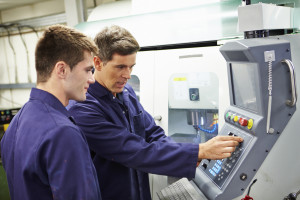 Who could blame them? Millennials, I mean.
Who could blame them? Millennials, I mean.
Why would they ever want to work in a factory?
After all, factories are dark, dirty, smelly, mind-numbing, repetitive, soul-less dungeons of despair. Populated only by those with sub-standard IQs who have lost all hope of a life. Right?
Add to that the never-ending messages kids hear from teachers, guidance counselors, politicians, media commentators, and even their parents that “You MUST go to College. The ONLY WAY you can have any kind of life is to go to College!”
So, who could blame today’s high-school grads? Why would they think of a career in manufacturing?
There’s just one problem . . . THAT PICTURE IS 40 YEARS OLD!
In the last 3 decades of the 20th century, manufacturing work fled the US in tidal wave proportions. The companies that remained in the business here had to reinvent their work models and processes. They had to learn to think differently, plan differently, operate differently, yet still be profitable.
They adopted Six Sigma, LEAN, Kaizen, ISO 9001 Certification, and Agile thinking and processes. Automation, computerization, and robotics came into play.
And to keep those workers who survived the job outflow, companies needed to re-evaluate how they designed the work environment and how to include floor workers in the process planning and continuous improvement methodology for ongoing success.
Manufacturing in the US underwent a Renaissance! So much so, that manufacturing work is now returning to the US from foreign shores.
What hasn’t changed, though, is the perception by the media and our educational system and our political leaders who continually promote a college degree as the ONLY TRUE WAY to a happy and successful life.
Kids are taught that the ONLY way to build a life is to go to college and “use their brain.”
And that’s what we in the manufacturing arena need to change. Manufacturing people DO use their brains. DAILY! And career paths can be charted. Fulfilling lives can be had that don’t require a college degree!
Changing perceptions won’t be easy. But it is do-able.
FIRST UP, OUTREACH to HIGH SCHOOLS
We need to educate the educators. Guidance counselors, teachers, and school district leaders need new insight into what’s involved in today’s factory.
We need to meet with these people and share what we do as well as how we do it. We need to talk about the skills we look for in new hires. And we need to share the opportunity young workers will have to learn new skills over time and how they can develop a true career, not just have a” boring job” to report to daily.
Manufacturing must respect that the Millennial generation is very focused on life choices that make them happy. If they’re not happy, they move on.
That said, not all Millennials want to go to College! Despite the deluge of messages they hear daily. Some like working with their hands, others just want out of the testing environment, and still others are not sure what they want yet.
So, let’s show them that Manufacturing work is NOT the mindless black hole of despair the media paints it as!
THINGS to DO to CONNECT with HIGH-SCHOOL KIDS
Keep it local. Adopt a high school.
- First, educate the educators. Ask for a meeting with the head guidance counselor. Lay out your thoughts about why a career that starts on the factory floor is indeed a solid career beginning. Explain the opportunities for growth and the ability to “do” something daily. Once you’ve gained this new ally, expand the discussion to include other educators in the school.
- Speak to kids in their classrooms. Don’t bother with big assemblies. Everyone knows you go to an assembly to hang out and waste time. But if you speak in a classroom, the kids cannot mentally hide from you. You also have the chance to engage them in conversation when in a small group.
- Use videos to show what it’s like to work on YOUR production floor. Don’t generalize it. Make it personal and make it real. Kids respond to real.
- Have this conversation/presentation led by factory floor supervisors. People who have been in the kids’ places and made a decision to enter the workforce right away. People who can share their fears, misconceptions, opportunities, and how they’ve been able to build a career, support a family, and grow professionally, all by starting out in a floor job. Again, kids will respond to authentic stories from earnest individuals.
- Consider setting up internships. Offer a high-school junior the chance to work in your shop for 8 weeks of their summer before their senior year. Give them substantive experience what it’s like to be a production worker. These kids would love to get a decent job for the summer, not to mention one that could help them figure out what to do when they graduate. Plus, they will share what they’ve learned and the revelations that occurred with their friends.
Want to change the Millennials’ perception of production work?
Have the Millennials get excited about the new era of manufacturing.
This generation is continually connected to the digital universe
and is not afraid to talk publicly.
They’ll share it “everywhere!”
Once your new hire is in place, here are a few ideas to integrate them successfully.
IDEAS to SUCCESSFULLY ONBOARD MILLENNIALS
You can also apply these ideas to Millennials you currently have on your team.
- Think through and deliver a thoughtful, multi-day onboarding process. Invest up to the first two weeks, not just a few hours, introducing the new hire to the workings of the plant (all departments), the processes and theories that go into efficient manufacturing and team collaboration, and the culture of your facility.
- Consider providing the new hire with a production floor mentor. Someone who will take a special interest in the person’s success and serve as a resource and “translator” for what’s happening at the plant. NOTE: If you do this, you should also build a “How to Be an Effective Mentor” program. People with good intentions still need good training to mentor well.
- Have programs in place that will combat the communication differences between the 25-year-olds and the 55-year-olds. The two groups will frustrate one another, though never meaning to. Here are a few of the perception challenges they’ll have of one another –
- “Youngers” don’t want to “pay their dues”
- “Olders” feel disrespected by a perceived lack of work ethic or attention to detail
- “Youngers” want to “make a difference” right away
- “Olders” prefer face-to-face communication, not texts
NOTE: You may want to hire an outside expert to help your team understand these communications differences and to help you build your program. You may even consider hiring this person to run the program quarterly. Ongoing training & progress monitoring is critical to ensuring these advances will take hold over the long run.
Once your new hires have been around, you’ll want to keep them engaged and not jumping ship in 9 months. Consider investing in job cross-training, production theory seminars, and going to school for various certifications. This generation is “self-centered” – they want to be happy, fulfilled, and do what they want. To keep them engaged, offer opportunities to grow.
Keep them informed of company plans, vision, milestones, quarterly progress, new initiatives, ideas being pondered – they want to know what’s happening or they feel cut off. Remember, this is the generation that believes they should be involved in EVERYTHING!
Whether you agree with their perspective or not, it makes sense to acknowledge and deal with how Millennials think and what their perceptions are. That’s how you’ll best understand how to make them involved and productive members of your factory team.
Consider working with area community colleges as well. They can be very open to career choice and “field” education for their students. Many of the above programs for high school could be adapted for them as well.
You may also want to team up with other manufacturers in your area. You could pool your talent and resources to create the educational outreach programs to area schools. Your messages could be made even stronger by having multiple view points and industries represented.
Not only that, but you could work together to build the internships and onboarding processes. Perhaps you could even split the bill for the outside consultant who will help you bridge that inter-generational communications gap!
Manufacturing jobs WANT to come back to the US
It’s up to us to create the talent pool to support the looked-for growth in US manufacturing. By becoming more outspoken and by investing in a community-focused outreach to today’s students, we can combat the labor drain that’s occurring as the Baby Boomers retire.
A very big THANK YOU to the executive team at Infiana USA Inc –
Bill Dolan, Operations Director, Nina Walters, Human Resources Director, and
Bob Shumoski, General Manager – for sharing their experiences, insights,
ideas, and collective wisdom on how manufacturers can
make manufacturing appealing again to the graduating generation.
If you’d like to connect with Infiana to discuss their specific outreach efforts, please email bill.dolan@infiana.com. They’d be delighted to share what they’ve learned.
